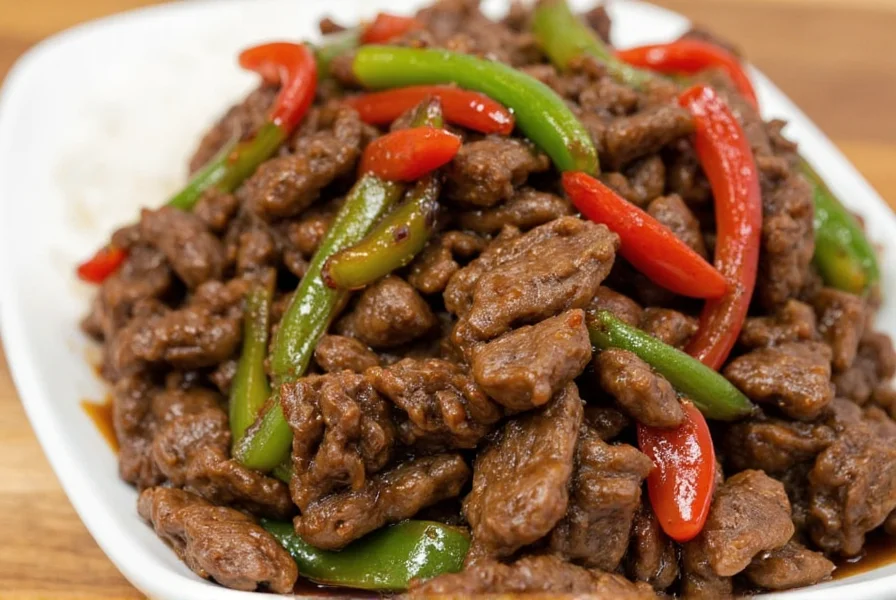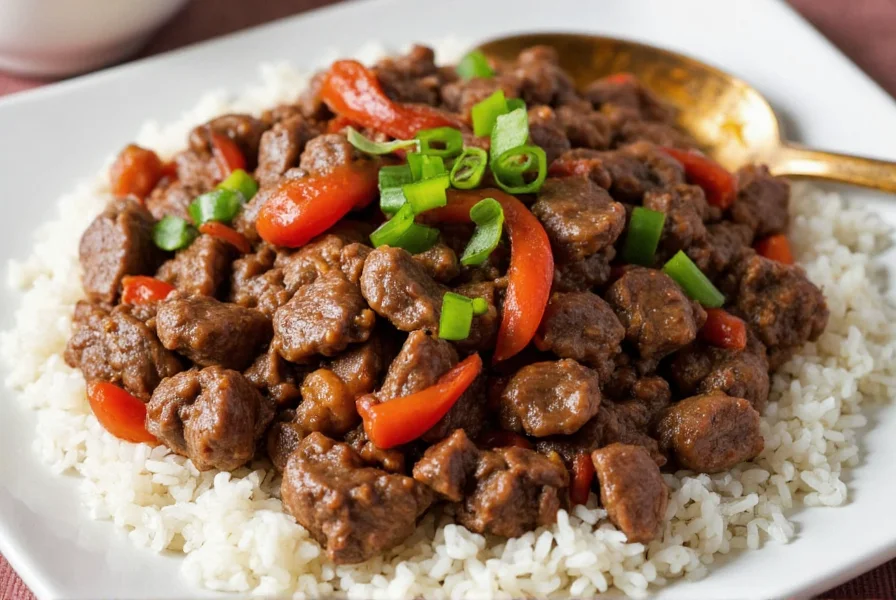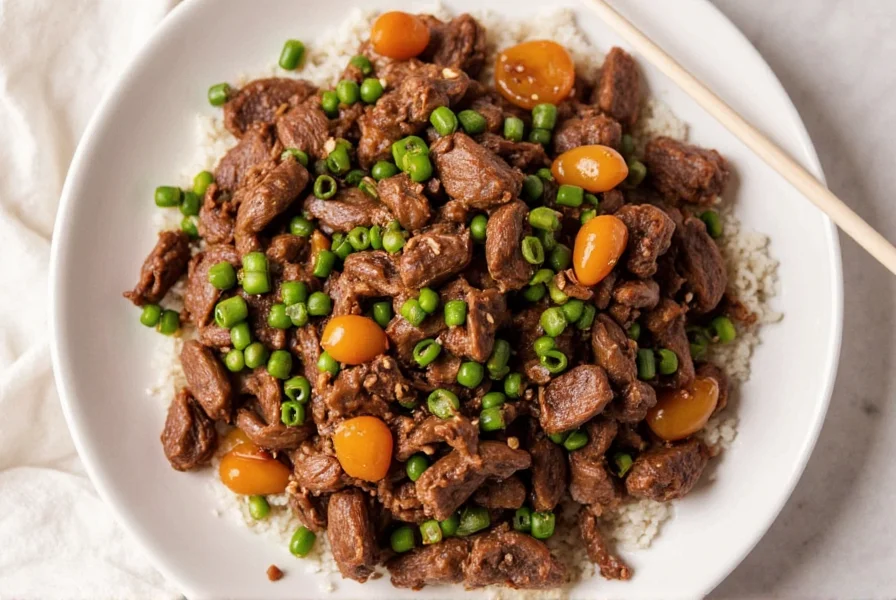Black pepper beef stands as one of the most beloved dishes in Chinese-American cuisine, offering a perfect balance of bold spice and savory richness. While variations exist across regions, the authentic preparation relies on simple ingredients executed with precision. This guide delivers a restaurant-quality recipe perfected through decades of culinary experience, focusing on techniques that ensure tender beef and complex pepper flavor without overwhelming heat.
The Secret Behind Perfect Black Pepper Beef
Many home cooks struggle with tough meat or flat flavor in black pepper beef, but the solution lies in three critical elements: proper beef selection, fresh pepper preparation, and precise cooking technique. Flank steak provides the ideal texture when sliced against the grain into thin strips, while freshly cracked Tellicherry peppercorns deliver aromatic complexity that pre-ground pepper simply cannot match.
Essential Ingredients for Authentic Flavor
Quality ingredients form the foundation of any exceptional black pepper beef recipe. Don't compromise on these key components:
| Ingredient | Quantity | Why It Matters |
|---|---|---|
| Flank steak | 1.5 lbs | Proper marbling and texture that stays tender when cooked quickly |
| Fresh black peppercorns | 2 tbsp | Provides complex floral notes and balanced heat (never use pre-ground) |
| Oyster sauce | 3 tbsp | Creates umami depth (use vegetarian alternative for seafood-free version) |
| Soy sauce | 1.5 tbsp | Adds saltiness without overpowering the pepper flavor |
| Sesame oil | 1 tsp | Finishing oil that enhances aroma without cooking bitterness |
Step-by-Step Cooking Instructions
Preparation (15 minutes)
- Place flank steak in freezer for 20 minutes to firm up for easier slicing
- Cut beef against the grain into 1/4-inch thick strips
- Combine beef with 1 tbsp soy sauce, 1 tsp cornstarch, and 1 tsp Shaoxing wine
- Marinate for 10 minutes while preparing other ingredients
- Crack black peppercorns using mortar and pestle or spice grinder (not too fine)
Cooking Process (8 minutes)
- Heat wok or cast iron skillet over highest heat until smoking
- Add 2 tbsp vegetable oil, swirl to coat surface
- Working in batches, sear beef for 60-90 seconds until browned but not fully cooked
- Remove beef, add 1 tbsp oil, then 4 minced garlic cloves and 1 tbsp ginger
- Stir-fry 30 seconds until fragrant but not browned
- Return beef to wok, add 3 tbsp oyster sauce, 1/2 tsp sugar, and cracked pepper
- Toss constantly for 2 minutes until sauce coats ingredients
- Finish with 1 tsp sesame oil and green onions

Professional Techniques for Restaurant-Quality Results
Master Chinese chefs employ several specialized techniques that transform this simple dish:
- Velveting the beef - The cornstarch and egg white in the marinade creates a protective layer that seals in juices during high-heat cooking
- Proper pepper preparation - Whole peppercorns toasted lightly before cracking releases essential oils while preserving complexity
- Wok hei (breath of the wok) - Achieved through proper preheating and constant tossing, this imparts a distinctive smoky flavor
- Sauce balance - The 2:1 ratio of oyster sauce to soy sauce creates depth without excessive saltiness
Avoiding Common Black Pepper Beef Mistakes
Even experienced cooks make these frequent errors that compromise the dish:
- Using pre-ground pepper - Loses volatile oils that provide aromatic complexity within hours of grinding
- Overcooking the beef - Results in tough, chewy texture; proper searing takes under 90 seconds
- Adding sauce too early - Causes ingredients to steam rather than sear, preventing wok hei development
- Using low-quality oyster sauce - Many brands contain excessive sugar; look for products with oysters listed first
Variations for Different Dietary Needs
This versatile recipe adapts beautifully to various dietary requirements without sacrificing flavor:
- Gluten-free version - Substitute tamari for soy sauce and ensure oyster sauce is GF certified
- Vegetarian alternative - Use king oyster mushrooms or seitan with vegetarian "oyster" sauce
- Lower sodium option - Reduce soy sauce by half and add 1 tbsp rice vinegar for brightness
- Spice adjustment - Toast peppercorns longer for deeper flavor with less heat intensity

Serving and Storage Recommendations
For optimal enjoyment, serve black pepper beef immediately over freshly steamed jasmine rice. The dish maintains best quality when consumed fresh, but leftovers can be stored properly:
- Refrigerate in airtight container for up to 3 days
- Reheat in wok with 1 tsp water to restore moisture
- Freezing not recommended as texture deteriorates
- Meal prep tip: Keep sauce separate from beef until ready to cook
Frequently Asked Questions
What's the best cut of beef for black pepper beef?
Flank steak provides the ideal balance of flavor and texture, but sirloin or ribeye work well too. The key is slicing against the grain into thin strips after briefly freezing. Avoid tougher cuts like chuck that won't tenderize properly with quick cooking methods.
Can I make authentic black pepper beef without oyster sauce?
Yes, substitute mushroom sauce or a combination of soy sauce, sugar, and vegetable broth. For similar umami depth, use 2 tbsp soy sauce, 1 tbsp hoisin, 1 tsp sugar, and 2 tbsp vegetable stock. The dish won't be traditional but maintains excellent flavor profile.
Why does my black pepper beef turn out tough?
Toughness usually results from either overcooking (beef should sear for 60-90 seconds max) or improper slicing (always cut against the grain). Marinating with cornstarch and a small amount of baking soda (1/4 tsp) also helps tenderize the meat without altering flavor.
How can I reduce the spiciness while keeping authentic flavor?
Toast the peppercorns before grinding to mellow their heat while enhancing floral notes. Use a 50/50 blend of black and white peppercorns, or reduce total pepper by 25% while adding 1/2 tsp Szechuan peppercorns for complex numbing sensation without intense heat.
What vegetables pair best with black pepper beef?
Traditional pairings include broccoli, snap peas, or bok choy added during the final minute of cooking. For Western palates, bell peppers and onions work well. Avoid watery vegetables like zucchini that release moisture and interfere with proper searing.











 浙公网安备
33010002000092号
浙公网安备
33010002000092号 浙B2-20120091-4
浙B2-20120091-4